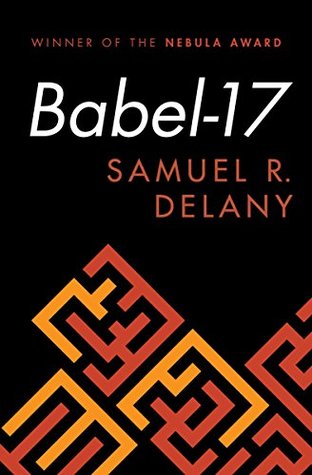Today I'm looking at another older science-fiction novel that I picked up on sale on Amazon. Babel-17 is set in a distant future where the humans of Earth have formed together into an Alliance for mutual defense with three alien species against the Invaders, a splinter group of humans and four other alien races. Recently the Alliance has suffered a series of mysterious sabotage attacks at their most secure facilities. The only clue uniting these attacks are coded messages that they have been unable to identify or crack that they call Babel-17. Out of desperation the military turns to Rydra Wong, the most legendary poet of the age, in the hope that she will be able to decipher Babel-17 and provide some clue as to when and where the next sabotage attempt will be. Wong puts together a crew and heads out into the depths of space to gather more information and decipher the mysteries of Babel-17.
This book has some really interesting ideas but it almost feels like it was necessary flavoring that was thrown into the book because it was a 1960's science-fiction novel and it needed to have some weird stuff in it. For example, cosmetic surgery is incredibly common among the portion of the population that works on spaceships, compared to the tattoos of sailors in previous centuries. There's also a concept of triples where people engage in what we'd call a closed triad, which is seen as unusual but not uncommon. Furthermore humans continue exist beyond death as discorporate entities who can fulfill important jobs on ships that would drive a mortal human insane. All of these are really interesting ideas but they seem to provide flavor to the book more than anything else.
The plot of the book centers around Babel-17 which goes into some territory that I'm not 100% on. Obviously I'm not a linguist so I'm no expert but this book leans pretty heavily on the trope of Language Equals Thought. The more I think about it the more unsure I am. A major point is that Babel-17 as a language has no concept of I and is somehow so insanely precise that it manages to unlock telepathic superpowers. I'm left with the feeling that I just didn't understand the plotline that Delany was trying to create with the language angle. Maybe if people know more about linguistics they might get more enjoyment out of this book but I'm afraid I was left feeling confused more than anything else.
Overall this book has some interesting ideas and I think it's worth checking out but I can't say whether I really understand it or not.
- Kalpar


No comments:
Post a Comment